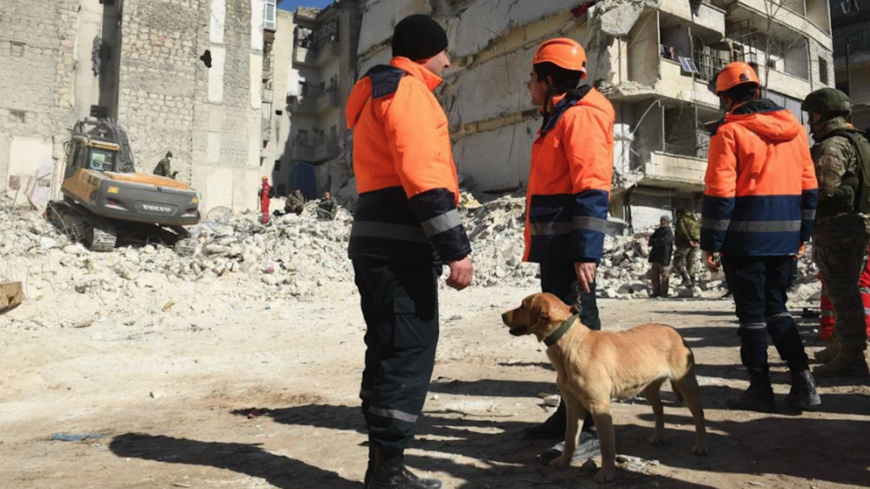The flurry of aid diplomacy in the wake of the pair of massive earthquakes in Turkey has shattered Ankara’s portrayals of friends and foes, as countries cast as “enemies” rushed to help in the search for survivors and offer humanitarian relief.
Turkey’s Islamists espoused the notion that only Muslims could be true brothers to each other, while nationalists promoted the mantra that “Turks have no friends other than Turks.” Drawing on such sentiments at their grassroots, the ruling Justice and Development Party and its ally, the Nationalist Movement Party, kept lashing out at “external enemies,” often as a diversion from domestic woes.
Certainly, the outpouring of international support is unlikely to result in new pages in all of Turkey’s troubled foreign ties, but it has shown that enmities cannot last forever. The two quakes, which hit nine hours apart on Feb. 6, caused colossal damage across 10 provinces in Turkey’s southeast, with the death toll surpassing 35,000 on Wednesday.
One of the most striking gestures of support came from Armenia, which lacks formal diplomatic ties with Turkey and lost a war over the disputed Nagorno-Karabakh enclave to Turkey-backed Azerbaijan in 2020. For the first time in more than three decades, Turkey opened the border on Saturday to allow the entry of Armenian trucks carrying humanitarian aid and rescuers. The thaw continued on Wednesday as Armenian Foreign Minister Ararat Mirzoyan visited the quake-hit city of Adiyaman.
Turkey and Armenia had already launched normalization talks before the disaster, but Turkey’s political climate remains far from fostering friendly feelings toward Armenia. And the talks are bound to stagnate unless key points of contention, such as transport routes and the status of Nagorno-Karabakh, are resolved.
Nevertheless, Armenia’s quake assistance has emerged as an opportunity for public diplomacy — and Mirzoyan's visit to Adiyaman was a good start.
Meanwhile, Azerbaijan, which is averse to Turkish-Armenian normalization before it seals a comprehensive peace deal with Amenia, dispatched the largest foreign team — nearly 900 people — to help with rescue and relief efforts in the disaster zone.
Greece stands out as another neighbor that rushed to help despite lingering tensions with Turkey over territorial disputes in the Aegean Sea and repeated threats by Erdogan that the Turkish military “may suddenly come to you one night.” Erdogan had continued to antagonize Greece even as he sought to mend fences with Egypt, Israel, Saudi Arabia and the United Arab Emirates — apparently to meet his need for an “external enemy” in the lead-up to elections that are due in June at the latest.
.subtext-iframe{max-width:540px;}iframe#subtext_embed{width:1px;min-width:100%;min-height:256px;}Greece’s civil protection minister personally led the delivery of humanitarian supplies to Turkey. Its foreign minister, Nikos Dendias, visited Hatay — one of the worst-hit provinces — with his Turkish counterpart, Mevlut Cavusoglu, last week. "We do not need to wait for natural disasters to improve our relations," Dendias said, while Cavusoglu voiced hope “to resolve disagreements through dialogue and in a sincere manner.”
Greek rescuers won much gratitude from the Turkish public for saving lives in the rubble, but one has to recognize that this is not enough to turn a new page in bilateral ties fraught with an array of long-standing problems, including territorial disputes, the Cyprus issue and Ankara’s claims that Greece has militarized islands close to the Turkish coast.
Moreover, Turkey was not that welcoming to assistance from the Greek Cypriots. Their offer to send a search-and-rescue team was politely rejected.
Also making use of quake diplomacy is Israel, which recently restored ties with Turkey. Israel’s President Isaac Herzog called Erdogan shortly after the first quake, and Foreign Minister Eli Cohen met with the Turkish president in Ankara on Tuesday — all while a 450-strong Israeli rescue team made its mark on the frantic efforts to pull survivors out of the rubble. All those steps are expected to add momentum to the normalization process that formally kicked off in late December when Israel’s new ambassador to Ankara presented her credentials to Erdogan.
NATO allies such as France and the United States, which have often been at odds with Erdogan, also offered support, as did Finland and Sweden, whose NATO membership bids are being blocked by Turkey.
China, whose treatment of the Uyghur community has often cast a pall on bilateral ties, won Turkish hearts by sending 467 rescuers and high-tech equipment.
Russia, whose ties with Turkey have been a mélange of cooperation and conflict, sent a 401-strong rescue team — the fifth largest after those of Azerbaijan, Spain, China and Israel.
Nechirvan Barzani, president of the Kurdistan Regional Government of Iraq — and who has enjoyed close ties with Ankara but often felt the heat of Turkish military operations on Kurdistan territory — also traveled to the quake-hit region to show solidarity.
Yet the disaster failed to produce any thaw in Turkey’s posture in Syria, whose northern regions, including Turkish-controlled Afrin, suffered widespread death and devastation from the quakes as well.
Ankara has refused to let Syrians cross into Turkey, but it agreed to reopen two border crossings for three months in addition to the one on the border with Idlib to allow the flow of UN-coordinated humanitarian aid. All three border crossings open up to rebel-controlled areas, while those controlled by the Syrian government and those opening up to Kurdish-held regions remain closed. Aid convoys from the Kurdish-run northeast were obstructed for days by Turkish-backed rebels before being able to reach quake-hit areas in the northwest, with Kurdish sources blaming Turkey. In sum, Ankara has not allowed any move that could affect the status quo in Afrin or jihadi-held Idlib.
This outlook suggests that the sense of common suffering has failed to produce any Turkish moderation vis-à-vis Syria, and stiff conditions remain in place in Russian-mediated efforts to restore ties between Ankara and Damascus.
Of note, the quake-ravaged Turkish provinces are home to large numbers of Syrian refugees who now face renewed misery and uncertainty. As Ankara scrambles to meet the needs of the affected population, the Syrians have come under mounting popular pressure to go home. Anti-refugee sentiments and hate speech were already running high, and many now see the disaster as an opportunity to send the refugees back.








